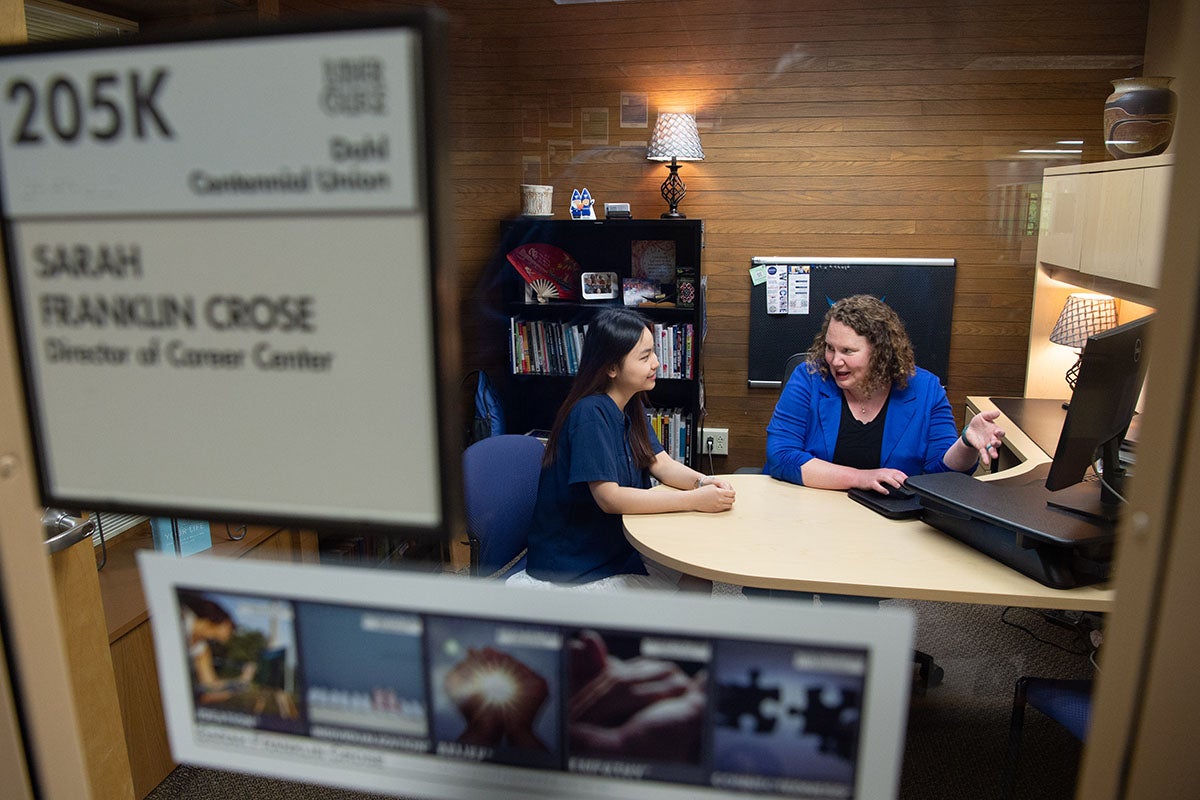How College Classes Are Different from High School

Students attend lecture in a Luther College classroom
Transitioning from high school to college is a big step, and one of the biggest changes is your experience in the classroom. From the way classes are structured to the expectations for students, college academics are a whole new world. Here’s a breakdown of some of the key differences you’ll notice upon starting your college journey.
Teachers vs. Professors
In high school, your teachers are certified educators who are trained to teach a range of students. In college, however, your instructors are called professors. They are both teachers as well as experts in their fields, often conducting research and publishing papers themselves. This means that your classroom experience can go much deeper.
For example, when I was in high school I remember learning the definition of biodiversity in a textbook, but nothing else. Once I was in college, I took a biology class where we went into much more depth about this topic. We participated in research, read extensive material about it, and connected it to other topics. Any questions I had were easily answered by my professor.
Don’t be afraid to ask questions or attend office hours. You have the opportunity to learn directly from someone who might be making real-world discoveries in the subject you’re studying.
More Lecture Autonomy
Forget about asking for a hall pass or raising your hand to go to the bathroom. College lectures treat you like an adult. You’re given a lot more freedom, but that comes with the responsibility to manage your own time and behavior.
Another difference between high school and college classes is that you often won’t get punished for missing class. That said, attendance still matters. Many professors outline attendance policies in the syllabus, and missing too many classes could impact your grade or your understanding of the material. It’s up to you to show up and stay on track.
You have the opportunity to learn directly from someone who might be making real-world discoveries in the subject you’re studying.
Emily Righter ’27
Higher Expectations
In high school, simply turning in an assignment might be enough to earn a passing grade. In college, the bar is set higher. Professors are looking for evidence that you understand the material, can think critically, and apply concepts, not just repeat them.
Assignments, papers, and exams often require you to think for yourself. Don’t be surprised if your first few grades are lower than you’re used to. It’s part of the learning curve, and you’ll improve as you adapt to the expectations.
Choosing Classes and Your Schedule
In high school, your schedule is mostly set for you. You may choose a few electives, but the structure is usually the same for everyone. In college, you’re responsible for creating your entire schedule. That means not only choosing what classes to take, but also when to take them. There are people to help you with this, but you’ll still need to do your own research. You will be assigned an academic advisor who will help you plan your schedule to make sure you graduate on time.
This flexibility is a huge perk, but it also requires strategy. You’ll need to balance your classes with time to study, work, eat, sleep, and relax. A poorly planned schedule can lead to burnout fast, so build your week with intention
More Reading
College professors often assign large chunks of reading, and it’s expected that you complete it on your own time. In high school you might be assigned to read parts of Romeo and Juliet, but if you were to do a unit like that in college, you would most likely be expected to read the entire play in a rather short period of time.
In many cases, lectures won’t even cover everything from the readings. Instead, they’ll build on that foundation or explore more advanced topics. If you’re used to going over every homework assignment in class, this will feel different. Come prepared by reading ahead, taking notes, and being ready to engage in class discussion.
Fewer Assignments, Bigger Impact
In high school, your grade might be made up of dozens of homework assignments, quizzes, and participation points. In college, you may only have a few major assignments or exams that determine your entire grade. This makes time management and understanding the material even more important. Missing one assignment can have a major impact, so stay on top of deadlines and don’t procrastinate.
 Office Hours Matter
Office Hours Matter
In high school, extra help might mean staying after school or visiting a tutoring center. In college, your professors and teaching assistants (TAs) offer office hours, which are scheduled times when you can drop in for questions, clarification, or advice. These sessions can be invaluable. Whether you’re confused about a concept or want to discuss an upcoming assignment, office hours are a chance to get one-on-one support, and demonstrate to the professor that you are a motivated student.
More Diverse Class Formats
In college, not all classes look the same. You might attend a large lecture with 200 students one day, and a small class with 15 the next. Some classes meet 2–3 times a week for shorter periods, while others might meet just once a week for several hours. You might have labs, group projects, or online courses as well. Learning to adapt to different formats is part of the college experience, and it’s all about finding what works best for you.
Self-Motivation Is Key
In high school, your teachers are there to remind you of deadlines, check in on your progress, and give frequent feedback. In college, most of that support fades into the background. You’re expected to stay organized, keep up with assignments, and actively seek help if you need it. Planners, calendars, and time-management tools are going to be your best friends.
College classes come with more freedom, but also a lot more responsibility. You’re in charge of your schedule, study habits, and your success. While the transition from high school to college can be challenging, it’s also invigorating. You’ll grow academically and personally in ways you never imagined. Remember, it’s okay to ask for help, make mistakes, and learn as you go. The key is to stay curious, disciplined, and take advantage of the opportunities around you
Related Posts

Studying requires not only time but strategy, consistency, and the right environment. Start building your study habits now to boost your focus, retention, and set yourself up for academic success.

Not sure what you want to study in college? Here are four simple things you can do to help you decide.
Admissions Office
Luther College
700 College Drive
Decorah, Iowa 52101
Phone: 563-387-1287